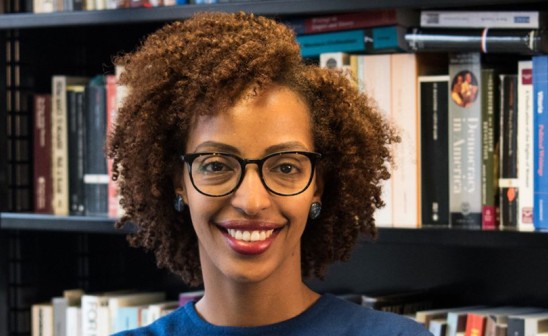Adom Getachew Is Energized by Conversation at UChicago

She shares substantive research interests with her colleagues, and their varying approaches and disciplines deepen the work.
By Sarah Steimer
With an acclaimed debut book, an instrumental role in the creation of a new university department, and numerous other collaborations, Adom Getachew is quickly making her mark at the University of Chicago. A Neubauer Family Assistant Professor of Political Science and the College, she is a political theorist with research interests in the history of political thought, theories of race and empire, and postcolonial political theory, with work that focuses on the intellectual and political histories of Africa and the Caribbean.
Getachew began her academic career at the University of Virginia where she double-majored in politics and African American Studies, initially planning to work in international development. She interned on Capitol Hill for a member of the Congressional Black Caucus, taking interest in U.S. policy toward Africa.
But during her internship, she found herself drawn to more historical debates and reading canonical works of anti-colonial thought. She was recruited to the Leadership Alliance and spent a summer at Yale University working on a research project on the Rwanda genocide.
“I enjoyed the kind of freedom to research independently,” Getachew says. “To let the ideas drive me, rather than a practical or policy outcome be the end point.”
She earned her PhD from Yale in political science and African American Studies, focusing on decolonization and anti-colonial thought. Her dissertation became her first book, Worldmaking after Empire: The Rise and Fall of Self-Determination. The project took her to archives in Trinidad, Barbados, Ghana, the UK, and Switzerland, and it examines what self-determination meant during the high point of decolonization between 1945 and the 1970s, when most African, Asian, and Caribbean states gained independence. The book explores the international politics of decolonization and the ways in which anti-colonial nationalists advanced alternative visions of international order so they might secure legal, political, and economic equality for their newly independent states.
Getachew came to UChicago in 2015 on a provost postdoctoral fellowship before becoming an assistant professor. “The political science department has a really rich history in political theory, international relations, and the study of race, ethnicity and politics” she says. “I found the interface between these sub-fields very exciting and a generative space for my work .”
In addition to teaching college core classes, she’s taught courses on race and imperialism in the 20th century, which takes some of the ideas from her first book and examines them from the late 19th century to World War II. She’s also co-taught a class with James Lindley Wilson, an assistant professor in the Department of Political Science, called “Global Justice and the Politics of Empire” that considers how the histories of imperialism and decolonization shape contemporary debates about global justice, and whether those are calls for reparations or demands for redistribution of resources in the globe.
She and Natacha Nsabimana, an assistant professor of anthropology, designed a course called “The Idea of Africa” that aims to think about representations of Africa — including philosophical texts, African art in museums, and culture — and how those ideas circulate, along with the kind of political and aesthetic uses for which they're mobilized. Nsabimana and Getachew ask students to think about contemporary questions about migration and citizenship, about economic globalization from the African continent, and about how Africa can also be the site to generate new ideas about modern political and economic questions. The course includes movies, trips to museums, and social scientific literature.
“I've really appreciated the opportunity to be experimental and collaborative in my teaching and to explore the many dimensions of my work,” she says.
Getachew has also been key in the creation of the new Department of Race, Diaspora, and Indigeneity. She was a participant in early conversations about the initiative and co-chaired the committee that earned approval for the department.
“I'm excited for the next phase of the department, which involves thinking through how we want to organize ourselves, what kind of hiring we want to do, what our vision of graduate education and undergraduate education is going to be,” she says.
In addition to her work with RDI, she recently finished editing a volume of W. E. B. Du Bois’s international writings from 1900 to 1956 with Jennifer Pitts, a professor of Political Science and the John U. Nef Committee on Social Thought.
Getachew is also collaborating with two curators at the Art Institute of Chicago, and a third at the Museum of Contemporary Art of Barcelona on a project that's funded by the Neubauer Collegium with the aim to research pan-Africanism as a set of histories, politics, and aesthetic practices in the long 20th century. They’ve designed a series of conversations, workshops, and other convenings with scholars, artists, curators, and archivists.
“Having interdisciplinary intellectual communities and institutionally supported resources has been central to making my work richer, helping it speak to wider audiences,” she says. “I feel energized by being in spaces where I'm in conversation with people with whom I might share certain substantive concerns or questions, but we approach them in very different disciplinary and methodological ways.”
 THE UNIVERSITY OF CHICAGO
THE UNIVERSITY OF CHICAGO

